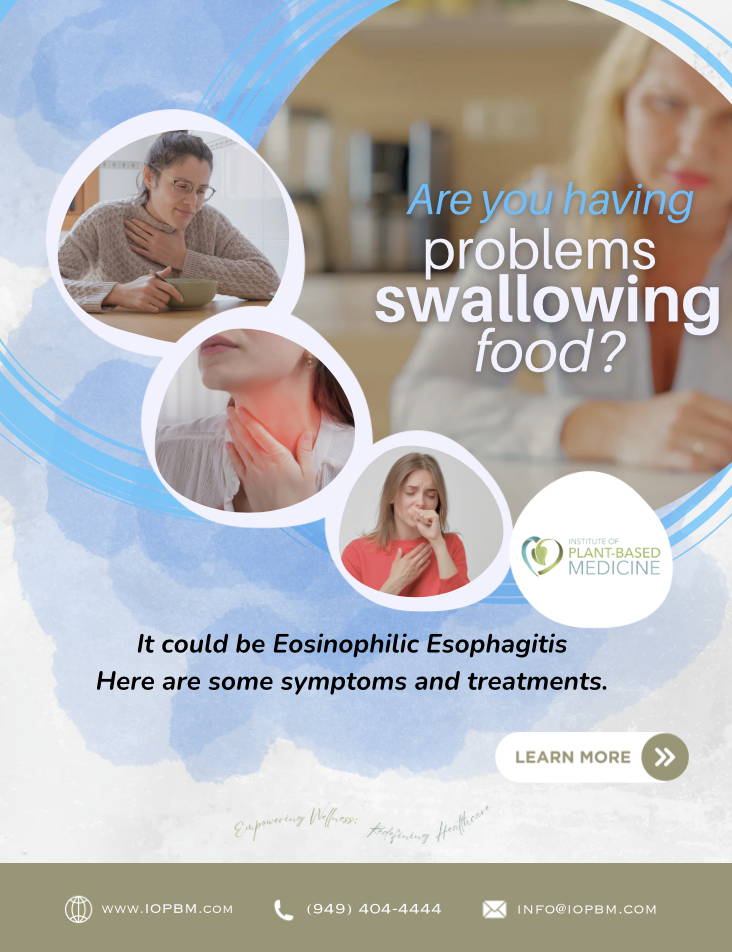No Products in the Cart
Are you having problems swallowing food? It could be Eosinophilic Esophagitis – Symptoms and Treatment
Eosinophilic esophagitis (EoE) is a chronic allergic inflammatory condition that affects the esophagus, the tube connecting the mouth to the stomach. In individuals with EoE, the esophagus becomes infiltrated with eosinophils, a type of white blood cell associated with allergic responses and inflammation. The presence of eosinophils in the esophagus can lead to various symptoms and complications.
Subscribe
To join our mailing list and never miss a Tuesday Article!

Eosinophilic Esophagitis
Living with eosinophilic esophagitis (EoE) involves a tailored treatment plan that addresses the unique aspects of this chronic condition. Among the array of therapeutic options, dietary adjustments, medication, and, in certain cases, dilation are key components. Let's explore these avenues of management to understand how they contribute to alleviating symptoms and improving overall well-being.
Symptoms
○ Difficulty Swallowing
○ Chest Pain or Persistent Heartburn
○ Abdominal Pain
○ Vomiting
○ Impaction of food in the Throat
○ Stunted Growth or Poor Weight Gain in Children
Dietary Therapy
Tailoring your diet to your body's specific responses is a cornerstone of managing EoE. Based on the outcomes of food allergy tests, your healthcare provider might recommend eliminating certain foods from your diet. This targeted approach, which may involve omitting items like dairy or egg products, aims to relieve symptoms and mitigate inflammation. In some instances, a more restrictive dietary regimen may be advised to optimize therapeutic benefits.
Medication: Addressing Underlying Inflammation
When it comes to medication, healthcare providers employ various strategies to address the underlying inflammation associated with EoE. The sequential approach typically involves:
Topical Steroid
If PPIs prove ineffective, your healthcare provider may recommend a topical steroid like fluticasone or budesonide. Administered in liquid form and swallowed, these steroids target esophageal inflammation without the systemic side effects often linked to steroid use.
Monoclonal Antibodies:
A recent breakthrough in EoE treatment is the approval of dupilumab (Dupixent) by the Food and Drug Administration (FDA). This monoclonal antibody serves to block specific inflammatory proteins in the body, providing a targeted approach to managing EoE. Administered weekly via injection, dupilumab offers a novel therapeutic avenue.
Proton Pump Inhibitor (PPI):
Initially, a PPI, an acid-blocking medication, may be prescribed. While this treatment is convenient, its efficacy varies, and not everyone experiences significant symptom improvement.
Dilation: Enhancing Swallowing Ease
In cases where severe narrowing (stricture) of the esophagus occurs, a procedure known as dilation may be recommended. This process, also referred to as stretching, aims to improve swallowing functionality. Dilation becomes a viable option when steroids yield limited benefits or if a preference exists to minimize prolonged medication use.
Questions
○ What could be the likely cause of my symptoms?
○ What specific tests are necessary for an accurate diagnosis?
○ Are there alternative approaches to the primary treatment you're suggesting?
○ How can I effectively manage my other existing health conditions alongside eosinophilic esophagitis?
○ Are there any lifestyle restrictions I should be aware of?
○ Is an endoscopy recommended in my case?
○ Is my condition expected to be temporary or chronic?
○ What course of action do you recommend for treatment?
○ Is there a generic alternative to the prescribed medication, and if so, is it suitable for me?
○ Are there informational brochures or printed materials available, and do you recommend any specific websites for further information?
It's important to note that these symptoms can overlap with other gastrointestinal and esophageal conditions, making an accurate diagnosis crucial. If individuals experience persistent or recurrent symptoms, it is advisable to seek medical attention for a comprehensive evaluation, including endoscopic procedures and biopsies for a definitive diagnosis of EoE. Early detection and management are key to improving outcomes and enhancing the quality of life for individuals with eosinophilic esophagitis.
Most Popular
The Ultimate Comprehensive Guide to GERD: Gastroesophageal Reflux Disease
December 11, 2023
Trending Articles
Unmasking the Connection: Meat-Heavy Diets, Cancer, and the Promise of Plant-Based Alternatives
October 27, 2023